
We go to Kabul to speak with an Afghan peace activist about the shooting spree by a U.S. Army sergeant in Afghanistan, which killed 16 Afghan civilians, nine of them children. Calls for a more rapid withdrawal of troops from Afghanistan have escalated after the U.S. soldier reportedly walked more than a mile from his base, breaking into three separate houses to attack families as they slept. Villagers say he then gathered 11 bodies and set them on fire, including the bodies of four girls younger than six. The attack comes as the United States and Afghanistan are negotiating the Strategic Partnership Agreement, the framework for U.S. involvement in Afghanistan after foreign combat troops leave at the end of 2014. “We feel that, surely, governments need to resolve this conflict through diplomacy and move away from the failed military strategy that has resulted in all that we are witnessing today,” says the Kabul-based peace activist who goes by the name “Hakim.” He is the coordinator for Afghan Youth Peace Volunteers. [includes rush transcript]
Transcript
AMY GOODMAN: A U.S. Army sergeant is in custody after he went on a shooting spree in southern Afghanistan, killing 16 Afghan civilians, nine of them children. The massacre took place Saturday night in Zangabad village in Kandahar province. The soldier reportedly walked more than a mile from his base, breaking into three separate houses to attack families as they slept. Villagers say he then gathered 11 bodies and set them on fire, including the bodies of four girls younger than six. A reporter for the New York Times who inspected the bodies after they were taken to a nearby U.S. military base said five of the children had a single gunshot wound to the head.
Some villagers reported that more than one U.S. soldier was involved. Neighbors and relatives of the dead say they saw a group of U.S. soldiers arrive at their village at about 2:00 in the morning, enter homes and open fire. But Afghan officials and NATO officials say the killer worked alone.
Afghan President Hamid Karzai said, quote, “This is an assassination, an intentional killing of innocent civilians and cannot be forgiven.” President Obama and Defense Secretary Leon Panetta called Karzai Sunday to apologize. As details continue to emerge, acting American ambassador to Afghanistan, James B. Cunningham, pledged that justice would be done.
JAMES B. CUNNINGHAM: Our thoughts and prayers are with the families and their entire community. U.S. forces are providing the highest level of care for those injured. We are still attempting to ascertain the facts. The incident is under investigation, and a United States servicemember has been detained. We deplore any attack by a member of the U.S. armed forces against innocent civilians and denounce all violence against civilians. We assure the people of Afghanistan that the individual or individuals responsible for this terrible act will be identified and brought to justice.
AMY GOODMAN: Authorities say the sergeant turned himself in after the shooting and is being detained in Kandahar. They have not released his name but say he is 38 years old and married with two children. He had served three tours in Iraq and was on his first deployment in Afghanistan. Officials confirm he was attached to a unit based at Joint Base Lewis-McChord in Washington state, where four Lewis-McChord soldiers were convicted of killing of three Afghan civilians in 2010. Those soldiers came to be known as “the kill team.”
As bodies of the victims were prepared for burial, The Guardian reports about a thousand people gathered to protest outside the Zangabad military base. The unprecedented attack comes as anti-foreign sentiment is already high, after Afghans discovered U.S. troops burning copies of the Koran at a military base. Despite official disavowal of the massacre, the incident has spawned adverse reactions. This is Kandahar resident Samiullah Khan.
SAMIULLAH KHAN: [translated] This incident will have a very negative impact on the people of Afghanistan. This kind of action will give motivation to the people to stand against foreigner forces and stage protests. This is a repeated action, and no one wants this again.
AMY GOODMAN: Since the attacks, the Taliban has threatened vengeance, and U.S. personnel in Afghanistan were warned of possible reprisal attacks.
The massacre has fueled calls for a more rapid withdrawal of troops from Afghanistan. It comes as the United States and Afghanistan are negotiating the Strategic Partnership Agreement, the framework for U.S. involvement in Afghanistan after foreign combat troops leave at the end of 2014.
Meanwhile, German Chancellor Angela Merkel arrived in Afghanistan Monday to pay a surprise visit to German troops. Germany is the third largest contributor of troops to NATO’s forces there. President Obama is set to meet tomorrow with British Prime Minister David Cameron to discuss plans for Afghanistan.
Well, for more, we go to Kabul, Afghanistan, where we’re joined by a peace activist who goes by the name Hakim. He’s coordinator for Afghan Youth Peace Volunteers. In Chicago, Illinois, we’re joined by Kathy Kelly, co-coordinator of Voices for Creative [Nonviolence], a campaign to end U.S. military and economic warfare. She has just returned from Afghanistan.
We welcome you both to Democracy Now! Hakim, let’s begin with you. The response to the shootings by the U.S. soldier?
HAKIM: Yes. Thank you so much for speaking to us in Kabul.
I must say that, from on the ground in Kabul, we sense anger from among Afghans, but a very remarkable restraint that has been called by the Afghan Interior Ministry. I think the real regret that Afghans sense is that governments, including the U.S. government and the Afghan government, is persisting in this conflict through militarism and not through diplomacy. And the people who pay the price all just be civilians, both soldiers and civilians alike.
AMY GOODMAN: What kind of reaction has there been in Kabul, which is far from where this took place, in Panjwai?
HAKIM: We have not seen or heard any reports of significant demonstrations in Kabul. Aghans in the streets are talking about and discussing the atrocity that happened, and [inaudible] understandably so, realizing that if the fundamental military strategy in Afghanistan does not change, it may lead on to further killing sprees like this, and may even lead to other September 11ths.
AMY GOODMAN: Kathy Kelly, you have just returned from Afghanistan, a longtime peace activist twice nominated for the Nobel Peace Prize. Talk about your response and what you have heard from Afghanistan this weekend.
KATHY KELLY: I think that the United States and military officials would like to characterize the massacre as exceptional, sort of one bad apple. But I think it actually encapsulates what the United States presence in Afghanistan has been all about. Unprovoked and uncaused attacks have been waged by the United States against Afghan civilians. It isn’t as though this was one deplorable act. This soldier was assigned to a Joint Special Operations Force base, and the Joint Special Operations Forces have been engaging in the night raids on an average of 10 per night, sometimes as many as 40 per night, all across Afghanistan and killing civilians steadily. And combine that with the drone surveillance and the helicopter—combat helicopter attacks that have killed civilians. Just in Kapisa three days earlier, four civilians were killed. This, of course, has fueled a long-simmering rage across Afghanistan, where 400 people are displaced every single day by the war and the fighting.
AMY GOODMAN: Hakim, talk about this attack after the burning of the Korans and the response, and what you feel needs to happen in Kabul and what the Afghan Youth Peace Volunteers are calling for.
HAKIM: What we feel in Kabul and what the Afghan Youth Peace Volunteers are calling for is for people in the United States and for people in Afghanistan to be calm, to be nonviolent [inaudible] and kind to one another, as we discuss with each other how to end the Afghan war. In particular, it is important to raise a crucial debate about the U.S.-Afghan Strategic Partnership Agreement, which you have mentioned earlier. This agreement is essentially a deal between the U.S. government and the Karzai government to maintain long-term U.S. military special operation forces in Afghanistan. And [inaudible] we know that the regional powers, Iran, the local powers, the Taliban and many political groups, including Gulbuddin Hekmatyar’s Hezb-e Islami, and other countries like Russia and China, through the Shanghai Cooperation Organization, already announced opposition to the signing of the Strategic Partnership Agreement. In other words, if people here and in the United States do not [no audio] —
AMY GOODMAN: We—Hakim, are you still there? We’ll try to get him back on, speaking to us from Kabul. He is coordinator for Afghan Youth Peace Volunteers. But Kathy Kelly of—with Voices for Creative Nonviolence, speaking to us from Chicago, but just back from Afghanistan, if you could—let’s see if we have Hakim on again. Hakim?
HAKIM: Yes.
AMY GOODMAN: Ah, OK. Continue with what you were saying.
HAKIM: I don’t know where I was lost, but I wanted to say that the Afghan Youth Peace Volunteers would call the ordinary people of the United States and Afghanistan to debate the U.S.-Afghan Strategic Partnership Agreement, which is a deal between governments to maintain U.S. military forces long term. And that will result in perpetual war, more such killing sprees, and possibly an increase in terrorism and terrorist acts like September 11th. What we need to do is to debate, in this time of economic crisis, how government can resolve this conflict in Afghanistan. And we feel that, surely, governments need to resolve this conflict through diplomacy and move away from the failed military strategy that has resulted in all that we are witnessing today.
AMY GOODMAN: Hakim, why do you choose not to use your real name?
HAKIM: I have been changed—my life has been changed in that sense by Afghans, and so my name has changed along with my—a change of my life. Afghans have been demonized as violent terrorists, and this is not the case. The Afghan Youth Peace Volunteers, for sure, are committed to a nonviolent way. And many people in Afghanistan want to get this message out to the rest of the world, that we want peace and we are tired of war. For that reason, and for the reason that it is probably better for—in terms of security to go by a name that they are familiar with, I have changed it to—my name to Hakim.
AMY GOODMAN: Well, Hakim, I want to thank you for being with us. We’re going to go to break, and then we’re going to continue with Kathy Kelly in Chicago. We’re talking about this aftermath of the killings of 16 Afghan civilians. A U.S. soldier has turned himself in for doing this. After that, we’re going to be talking about the first anniversary of the Fukushima disaster. More than 20,000 people died after the tsunami. Stay with us.

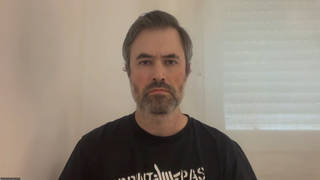
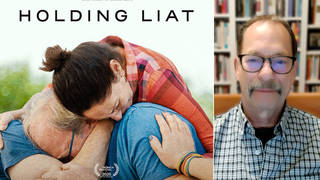
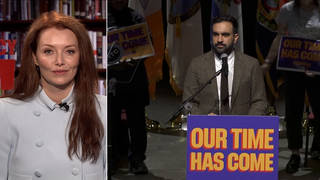
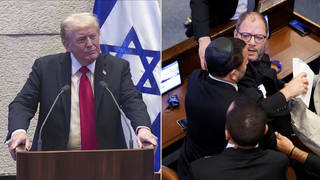





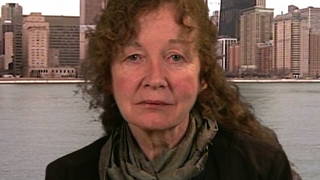
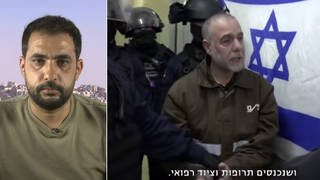
Media Options